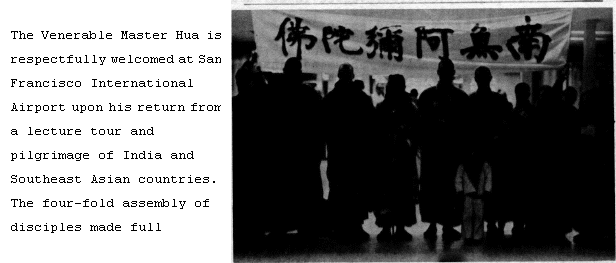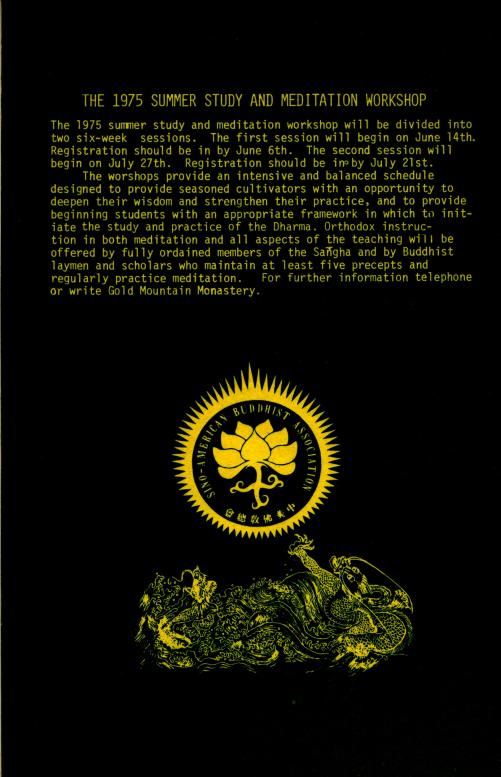ORTHODOX BUDDHISM IN A MODERN AMERICAN MONASTERY
By American Upasika Kuo Ts’an Epstein
Upon first becoming acquainted with Gold Mountain Monastery and the Sino-American Buddhist Association, one is immediately struck by the harmonious blending of two entirely different cultures, (Chinese and American) and by the straightforward sincerity of those involved with it. There is no rush to gain members, no indoctrination, no one pushing anyone to believe anything. Yet those involved are open to criticism and questions, and are more than happy to explain themselves and accept new people. There is only one prerequisite and that is that one be straightforward and honest with oneself.
In the present age when innumerable confused impostors are claiming to have the secret to enlightenment and even charging money to mislead their followers with clever words which lack insight, the Abbot of Gold Mountain Monastery, the Venerable Master Hsuan Hua, preaches hard work. Though he insists that his disciples work hard and constantly reminds them that the path is long and difficult, his American disciples already number in the hundreds. Although the monastery is less than ten years old, inspired by the Master's words, his disciples have worked inconceivably hard, and many of them-have already become well-educated students and teachers of the Buddhadharma.
Of these disciples, more than fifteen men and women have formally "left home" in the orthodox tradition and received full ordination, becoming the first Western Bhiksus and Bhiksunis. These men and women have realized the impermanence of the world and of their lives. Consequently, they have given up everything in order to cultivate the orthodox Buddhadharma so that they may end the ceaseless suffering caused by the uninterrupted cycle of birth and death. To this end, those who have left home, as well as the majority of others who live at the monastery, cultivate the ascetic practices of never lying down to sleep and eating only one meal a day. From 4:00 a.m. when they arise until 9:50 p.m. when they may go to sleep, they work with untiring vigor in meditation, lecturing and translating sutras, learning many languages, running the monastery, publishing a monthly periodical, as well as investigating the Dharma in their individual studies. As this is the foundation of orthodox Buddhism in the West, it is essential that everything be built and run properly.
The Master insists that all of his disciples strive to turn from greed, hatred, and stupidity, and cultivate morality, concentration, and wisdom. He also encourages all to deepen their study, widen their perspectives, and seek the advice of Good Knowing Advisors. On founding Gold Mountain Monastery the Master wrote the following doctrine by which the monastery should guide its growth and propagation of the Buddhadharma.
THE GOLD MOUNTAIN DOCTRINE
Freezing,
we do not scheme.
Starving to death, we do not beg.
Dying of poverty, we ask for nothing.
We accord with conditions but do not change,
We do not change and yet accord with conditions.
These are our three great principles.
We
renounce our lives to do the Buddha's work.
We shape our lives to create the ability
To make revolution in the Sangha Order.
In our actions we understand the principles
So that our principles are revealed in our actions.
We carry out the pulse of
The Patriarch's heart transmission.1
Rather than discouraging his disciples, the fact that the Master's lectures are delivered in Mandarin Chinese has given many of them the incentive to learn the language in an amazingly short amount of time. Because of this, those who do not yet understand Chinese are able to hear English translations rendered by those competent in both the language and in the understanding of what is being lectured. Still, just to hear and watch the Master speak, even if you do not understand the language, is, in itself, a treat. He constantly employs expedient devices, humor, analogies, poems, and questions and answers, which, along with his personal magnitude, capture the interest of all who listen, causing them to deepen their understanding and insight.
What is Buddhism like in an orthodox Buddhist monastery? Buddhism is simply a method of understanding that which you do not understand. The monastery is merely a place in which many students have come together, with the help of a Good and Learned Advisor, to understand their original nature. The Master has said: "I hope that you will all believe in yourselves and not me, because what I say is not what you say, and what I believe is not what you believe. If you believe in yourself, you can, without a doubt, study to become a good person, and if you believe in yourself you can, without a doubt, accomplish Buddhahood, since being a good person enables one to accomplish Buddhahood."2

There are no tricks, no secret shortcuts, just a great deal of hard work
and faith. Yet all that hard work and faith, no matter how many lives it
takes, will bring results. If you plant the seeds of enlightenment, you
will reap the fruit of enlightenment. If you plant the seeds of pain and
suffering, you will reap the fruit of pain and suffering. All living
beings have the potential to become enlightened, it is merely necessary to
plant the seeds of morality, concentration, and wisdom. With time, the
tree of enlightenment will grow and greed, hatred, and stupidity will fall
away. Simply having no ignorance, that is enlightenment, and the goal of
those at Gold Mountain Monastery.
LETTERS December 26, 1974
Venerable Bhiksuni Heng Yin,
I have received a few days ago two of your publications: "Pure Land and Ch'an Dharma Talks" and "Records of the Life of the Venerable Master Hsuan Hua" (Vol. One). I don't know who sent them from the Gold Mountain Monastery—answering thus my letter in which I requested some publications--but as you are the compiler and translator of one of them and the co-translator of the other, I am writing to you.
First of all I would like to express my deep gratitude for this gift of the Dharma. Living in a country where Buddhist books cannot be purchased and the Dharma cannot be heard, I appreciate your helpfulness and generosity very much indeed. These books are not just ordinary books about Buddhism, but a biography and teachings of the greatest Buddhist master of our time. The Venerable Master Hua's Buddhism is not a mere branch of Buddhism, but the very teachings of Sakyamuni himself. This is the very first time that living Chinese Buddhism correctly preserved has been transmitted to the West - moreover in excellent translations, which keep the spirit and flavor of the original. How lucky am I that I can read them! I am going to sit in meditation during my holiday according to the Gold Mountain Monastery's schedule, and read every day the Master's lectures as if he were here with me. I have practiced Zen meditation for years, but nobody has ever given me such encouragement as the example and Dharma words of the Venerable Master Hua.
I sincerely hope that you are willing to help me spread this true Dharma further to Eastern Europe. Would you please send me a copy of your translation of the "Sixth Patriarch sutra" with a commentary by the Venerable Master? Also, may I hope to receive your forthcoming translations?
Please give my most respectful regards to the Venerable Master Hsuan Hua. After reading his talks, I cannot but consider myself his humblest disciple.
Trusting in the compassion of you all, I am
Yours in the Buddhadharma,
(Mr.)
Gabor Terebess
Ormezoi
ltp. 7/a IX. 57
1112
Budapest, Hungary
